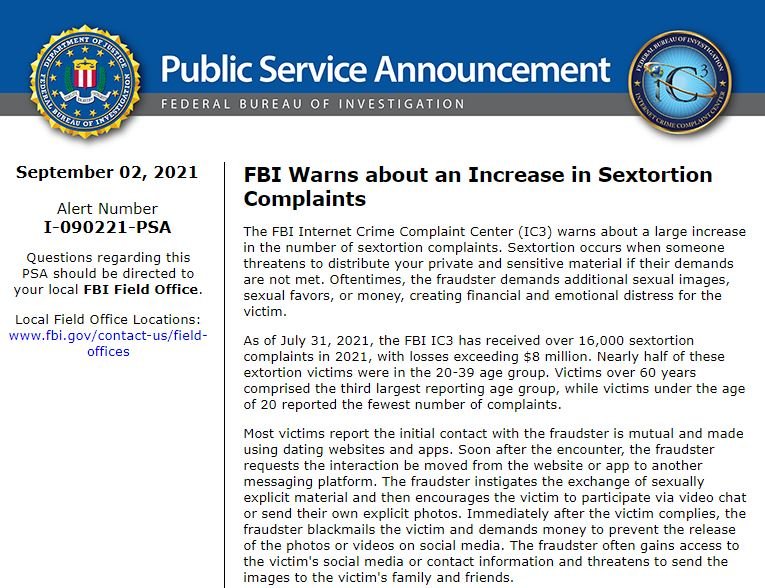The Federal Bureau of Investigation (FBI) recognizes that crimes related to sextortion have increased excessively since the beginning of 2021, generating losses of up to $ 8 million USD for victims during the first half of the current year. Through the Internet Crime Complaint Center (IC3), the Agency has received some 16,000 sextortion complaints, most filed by women between the ages of 20 and 39.
Cybersecurity experts define sextortion as the cybercriminal practice in which the attacker threatens a potential victim with leaking intimate photos, videos, or messages unless the victim pays a ransom. These campaigns, usually deployed via email, can also involve the use of Trojans and other malware variants.

Although there is no consensus on the detection dates of the first cases, the cybersecurity community agrees that this practice began to become widely known in 2018, experiencing growth possibly related to the use of social media platforms and dating apps.
In its report, the IC3 notes that most victims are contacted on conventional platforms such as social media and dating apps, where scammers pose as ordinary users. After gaining the trust of a victim, the cybercriminal will try to arrange a chance encounter or take the conversation to another platform or website, which should be considered a red flag.
Although there is no consensus on the detection dates of the first cases, the cybersecurity community agrees that this practice began to become widely known in 2018, experiencing growth possibly related to the use of social media platforms and dating apps.
In its report, the IC3 notes that most victims are contacted on conventional platforms such as social media and dating apps, where scammers pose as ordinary users. After gaining the trust of a victim, the cybercriminal will try to arrange a chance encounter or take the conversation to another platform or website, which should be considered a red flag.
The main recommendation for those who are victims of sextortion is to immediately interrupt any communication with criminals, in addition to blocking them from their social networks and other contact platforms. For victims in the U.S., it is recommended to file the corresponding complaint on the official IC3 website.
The IC3 report also includes various tips for Internet users to protect themselves from sextortion and any other similar attack variants:
- Turn off your electronic devices and webcams when not in use
- Never, under any circumstances send compromising images to strangers, no matter what platform they have contacted
- Don’t open attachments from people you don’t know. The links may contain malware capable of hacking any electronic device in order to access sensitive files, including photos, videos, and intimate messages.
To learn more about information security risks, malware variants, vulnerabilities and information technologies, feel free to access the International Institute of Cyber Security (IICS) websites.

He is a well-known expert in mobile security and malware analysis. He studied Computer Science at NYU and started working as a cyber security analyst in 2003. He is actively working as an anti-malware expert. He also worked for security companies like Kaspersky Lab. His everyday job includes researching about new malware and cyber security incidents. Also he has deep level of knowledge in mobile security and mobile vulnerabilities.











